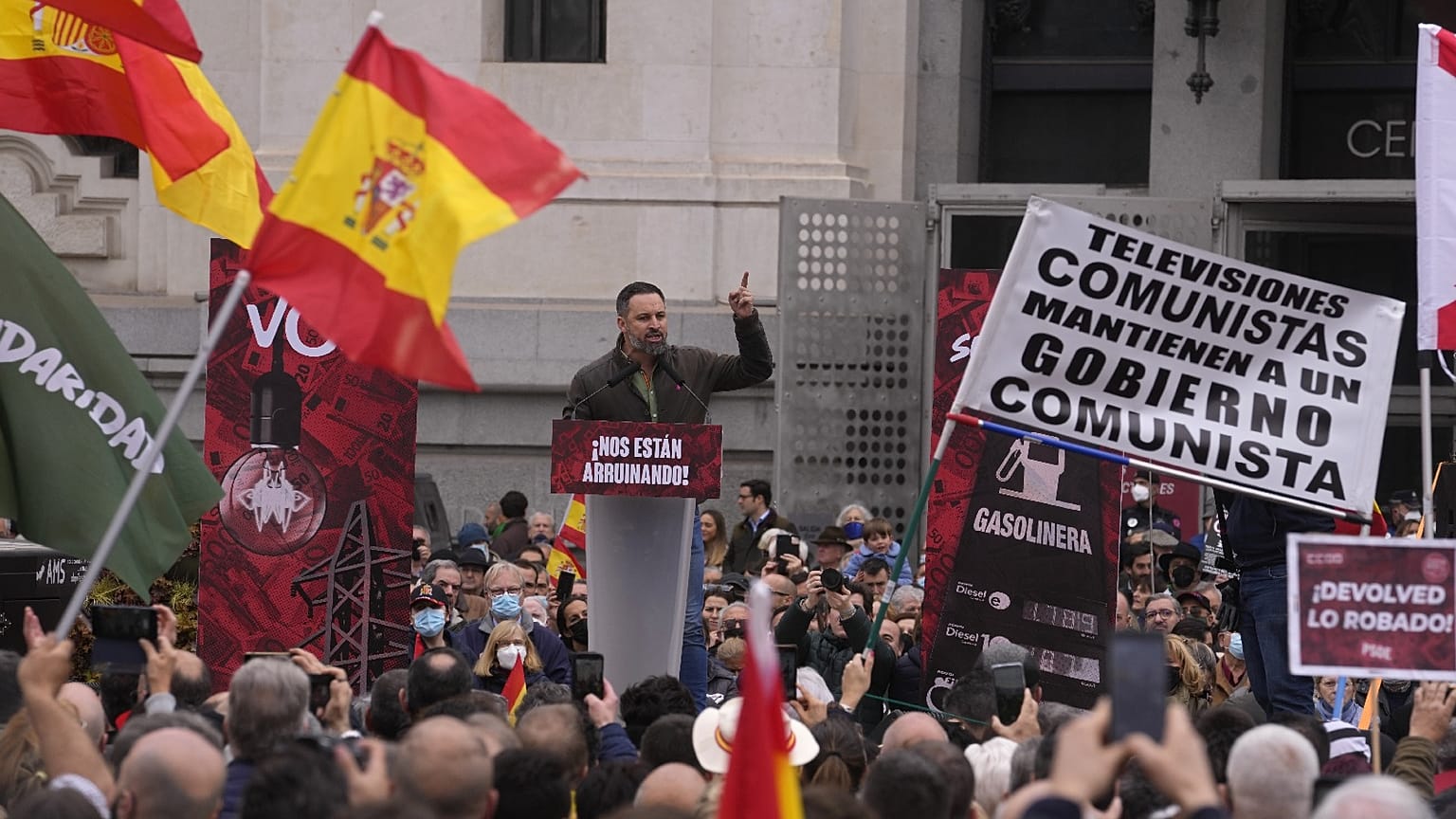Vox could be part of the national government after the election on 23 July. Some decisions the party has taken at the regional level have already drawn condemnation.
The rainbow flag has taken centre stage in Spain’s increasingly bitter election campaign.
 ADVERTISEMENT
ADVERTISEMENT
 ADVERTISEMENT
ADVERTISEMENT
The far-right Vox party insisted that the symbol of the LGBT movement should be removed from the regional authority offices in the Balearic Islands, prompting a reaction across the country.
The flag was also in the crosswires in other local authorities where Vox has struck a deal to rule in alliance with the moderate conservative People’s Party (PP), after the Right won convincing victories in local elections in May.
It is part of a culture war which has erupted in Spain’s already polarized political scene ahead of snap elections on July 23.
Vox, a nationalist-populist movement rather like The Brothers of Italy, Fidesz in Hungary and the Law and Justice party in Poland, was in the political wasteland five years ago but it is now the third-largest party in the Spanish parliament and could play kingmaker after next month’s election if, as a series of polls suggest, the PP win the most votes.
Critics name gay and women's rights as among Vox's targets and say it also opposes the trans lobby, illegal migrants and Islam.
“This party is not only a threat to feminists but to the LGBT collective and to immigrants,” Patricia Aranguren, of the 8M Commission in Madrid, which was named after the International Women’s Day celebration, told Euronews.
“We are determined not to let any of the things which have worked so hard to achieve be taken away if they come to power.”
Intrafamilial vs domestic violence
The hard-right party would like to end same-sex marriage as Vox believes only marriage between men and women is “natural” but they do concede that civil partnership is permissible. Vox would also bar adoption by gay couples.
However, Santiago Abascal, the Vox leader, told a rally in Barcelona on Saturday that his party supported homosexual rights.
“The Supreme Court does not allow any unofficial flags (to fly) on public buildings and many homosexuals, who vote for us, feel represented by this (Spanish) flag which respects them, that of Spain, that of all us,” he said.
The fight against domestic violence has also figured prominently in the election campaign.
In Valencia, where the conservative PP will share power with Vox, regional authorities changed the definition of domestic violence to ‘intrafamilial’ violence.
Both parties promised measures to fight the “intrafamilial violence, especially that suffered by women and children, guaranteeing equality between all victims”.
Vox contends that both men and women can be victims of domestic violence, but official statistics show most victims are women. In 2022, there were 41,321 domestic violence incidents, of which 37,593 involved women and in 3,495 cases the victims were men, according to government figures.
A difficult line to toe for PP
Spain’s conservative People’s Party (PP) and Vox, a potential coalition partner, would still win enough seats to form a government but have lost some ground to the ruling Socialists, according to two polls published on Monday.
Alberto Núñez Feijóo, the PP leader, has consistently said he would seek an absolute majority, but polls suggest his party will fall short of the required numbers.
The PP leader, who fashions himself as a moderate, has had to tread a careful line with Vox.
In Valencia, a local PP leader claimed that “domestic violence does not exist”, forcing Núñez Feijóo to intervene, saying his party “would not take one step backwards in the fight against this problem”.
The row sparked over domestic violence in Valencia threw the PP into a quandary; it did not want to destroy a deal with Vox but knew it could alienate voters if it did not show support for women.
In Extremadura, a western region, the PP faced a similar dilemma.
At first, the PP leader Maria Guardiola vowed she could not deal with a party which “denies machista violence, that dehumanises immigrants, that throws the LGBT flag in the bin”. Then shortly afterwards she said her party had no choice but to strike a deal with Vox to govern.
'We see a regression'
Trans rights could also be under threat if a right-wing coalition government wins power.
In February, Spain became one of the first countries in Europe to allow gender self-determination from the age of 16 without the need for psychological or medical evaluation.
Both Vox and PP have threatened to repeal this law, launching a legal challenge in the Constitutional Court.
At the same time, the PP lit up its headquarters in the rainbow colours of the LGBT movement to mark Madrid Pride last week.
Campaigners for the LGBT lobby said events in Spain were part of a Europe-wide attack on rights which had taken decades to win.
“The situation in Spain is becoming more and more alarming. We see a regression in the rights for which we have fought for a long time,” Luis Fernando, the general coordinator of Arcopolis, a Madrid-based group, told Euronews.
“We have the impression that it is not only the far-right parties but a section of the society in general which supports them. Vox is just the symptom of a situation of LGBT-phobia. Behind them there are people who support them.”














